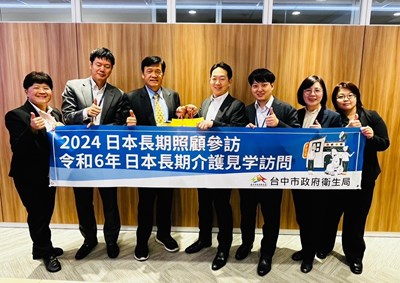
Taichung City is home to 469,454 senior citizens, making up 16.43% of its population, highlighting the importance of long-term care policies in municipal governance. To improve the city's long-term care service quality, Health Bureau Director Tseng Tzu-chan led a team on a visit to Japan from November 11 to November 15. The visit aimed to learn from Japan's extensive experience in long-term care as a reference for future long-term care service planning.
Director Tseng highlighted the city government's ongoing efforts to expand long-term care resources and develop an extensive care network. As of October, Taichung had established 1,853 long-term care facilities, 10 dementia care centers offering case management, and 45 dementia service locations, achieving full administrative district coverage. With the highest number of institutions in the country, Taichung also ranked first both nationally and among the six municipalities in last year's long-term care evaluations by the Ministry of Health and Welfare.
The Health Bureau noted that Japan, as the first Asian nation to encounter the challenges of an aging population and declining birthrate, has developed a wealth of experience in long-term care. During the visit, the team visited six facilities, including a local welfare urban rehabilitation organization, a medical collaboration center, a specialized eldercare facility, a regional community-focused nursing home, the Yokohama Tsurumi Senior Complex Housing Facility, and the Sakurajyuji Group Tokyo Office with its private nursing homes. They learned about Japan's comprehensive care system planning, multi-tiered and continuous care service models, integration of institutions with local communities for inclusion and intergenerational interaction, as well as its use of technology to address labor shortages, which not only alleviates caregiver workload but also improves care quality.
According to Mr. Masato Kaji, Executive Director of the Sakurajyuji Group Tokyo Office, Japan's long-term care insurance and associated systems have evolved significantly since their launch. The number of care facilities in Japan has increased sixfold, and the focus has shifted from simply ensuring safety to enhancing the quality of life for those receiving care. Facilities are closely integrated with their communities, promoting interaction and even serving as spaces for local residents to relax and connect, fostering community inclusivity. Taiwan, potentially facing similar transformations in the future, can use Japan's experience as a valuable reference to plan ahead.
Director Tseng noted that Taiwan is set to become a super-aged society next year. The visit to Japan provided an opportunity to study its long-term care strategies, including planning, challenges, and solutions. Of particular interest was Japan's successful integration of care facilities with local communities, fostering an “aging in place” model. By leveraging these experiences, Taichung aims to incorporate its approaches into its long-term care service planning, striving toward the goal of “Prosperous Taichung, Enhanced Long-term Care.”

 Facebook
Facebook
 Twitter
Twitter
 LINE
LINE